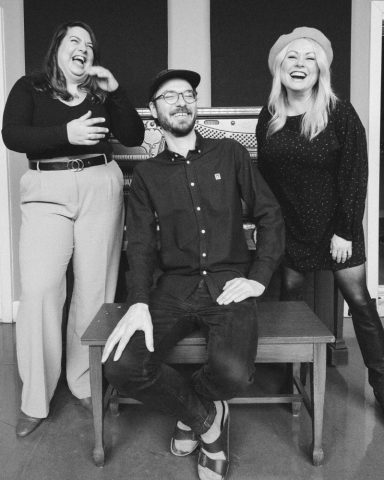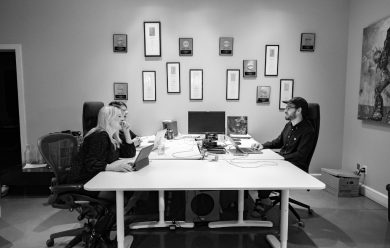 “Iohann and I have been working together for more than 25 years alongside our screen composer partners,” says Mitsou, right off the bat. “With the three acquisitions we made [Harris & Wolff, Maisonnette and Ray-On], we wanted to offer a service under the Ray-On banner.” Ray-On offers unique music services for screen productions, including original music composition, music research and supervision, rights clearance, as well as access to a pre-cleared music bank of more than 3,000 works, mainly from Québec and Canada.
“Iohann and I have been working together for more than 25 years alongside our screen composer partners,” says Mitsou, right off the bat. “With the three acquisitions we made [Harris & Wolff, Maisonnette and Ray-On], we wanted to offer a service under the Ray-On banner.” Ray-On offers unique music services for screen productions, including original music composition, music research and supervision, rights clearance, as well as access to a pre-cleared music bank of more than 3,000 works, mainly from Québec and Canada.
Iohann Martin, who co-founded Dazmo (25 films, 15 TV series) with his business partner Mitsou a quarter of a century ago, already had business ties with Harris & Wolff, specialists in music placement. He sniffed out a good opportunity to diversify his music production activities.
“We were thinking about offering a complementary service for music that fleshes out a scene without necessarily being connected to the narrative framework of music, simply to add ambiance and colour, a complement to the soundtrack,” says Martin. “There’s a will to maximize the artistic potential to produce music that fits in a genre that I call musical nuance.
“While we were working on the music for the immensely popular TV series La Galère, the Dazmo team took full measure of the challenge. We had to write three or four songs per episode on top of the soundtrack itself: it was a very tall order.”
Once the purchase of Ray-On was realized, the musical offer was now complete. Its catalogue of pre-existing music includes an intuitive platform that editors, directors, and producers can access directly, but also, as Mitsou points out, “with a selection of local artists whose works are renewed frequently.”
The soon-to-be-aired series Mégantic is the collective’s latest accomplishment. At its core, Dazmo is a team of composers — Sari Dajani, Rudy Toussaint, Pierre-Luc Rioux and Ioann Martin — and is now under the guidance of Ray-On, the organization that supervised the whole musical aspect of Mégantic, thanks to its new music supervision service.
That brought sync and rights clearance into this new environment. Ludivine Lavenant is very proud of this unique and diversified catalogue of Canadian and Québec composers. One artist she’ll be promoting to the Netflix, Disney+, and the rest of the competitive music-placement world, is newcomer Olivia Khoury, “who’s doing Bon Iver-style jazz-folk”— in the hopes of placing her music in series, films, and ads.
“It’s really an efficient way for musicians to get their names out there,” says Mitsou. “We want to democratize and promote our music supervision service, because it’s not very well-known in Québec. For Ray-On’s clients, we’re a one-stop shop, an opportunity for productions to have integrated services. A song sync in a TV series or a film can have a major impact on an artist’s profile. Music supervisors are curators, they gloat when they’re sent new, original music that’s not yet on the market. That’s the edge of pitching music that will be released in three months — offering a song by someone who’s very well-established isn’t as important to them.”
“When we started in 2013, we were often asked for existing music,” explains the experienced gatekeeper of sounds. “A sound bank of 3,000 musical works for TV, movies, and advertising — with a search engine to satisfy the needs of the client with variables like singing by a male, a female, or a choir, a specific bpm, etc. — did not exist in Québec.”
As Mitsou explains, “Promoting our composers through our platforms and supporting a new generation of local talent is one of our goals for the next few years. Right from the start, I gave myself the mission of promoting more female composers and producers.” Then, she says, with a sparkle in her eye, “Music is just as important as lighting in a visual production! You just need to know how to use it well.”
 Simon Bourdou works closely with Mitsou, soliciting contracts for members of his team of composers at Ray-On in the endless jungle of global visual productions. He spent five years with the M for Montréal and Mundial Montréal organizations before getting on board in 2017. “I’ve always been close to emerging artists. Discovering music is the essence of my work,” he says, a few SOCAN Awards adorning the wall of his office in the background, notably for the Canadian series How It’s Made.
Simon Bourdou works closely with Mitsou, soliciting contracts for members of his team of composers at Ray-On in the endless jungle of global visual productions. He spent five years with the M for Montréal and Mundial Montréal organizations before getting on board in 2017. “I’ve always been close to emerging artists. Discovering music is the essence of my work,” he says, a few SOCAN Awards adorning the wall of his office in the background, notably for the Canadian series How It’s Made.
“Directors and producers tell us what they need, music-wise, and we then recruit the team of composers who fit the best with the music they’re looking for. We realized that the biggest export and revenue potential for our artists truly lie in AV,” says Bourdou.
Among the composers on the Ray-On roster are rapper and producer Boogat, composer Mathieu Vanasse, Latin singer Ramon Chicharron, jazz guitarist Benoît Charest (who gave us the soundtrack for the movie Les Triplettes de Belleville), Carole Facal’s electro-pop, and promising singer-songwriter Naïma Frank. Almost all of these artists have songs hosted by Ray-On that have been synced.
Mitsou can list the most successful musical placements achieved by Ray-On without batting an eyelash: Emily in Paris and Tiny Pretty Things (Netflix), Soulmate (Amazon Prime), Woke (Sony Pictures), to name but a few, as well as clients from the advertising world such as Nike and Red Bull, a Ubisoft videogame, Crew 2, for sync and rights clearance, Xavier Dolan’s film The Death and Life of John F. Donovan, the Canadian comedy Wong and Winchester…
Ray-On is a promising company, especially since it has reached its full cohesion in a single year. Mitsou is the artistic director, a pivotal role in creating the right connections with producers, directors, and artists.
“I must say, Mitsou is passionate about discovering artists,” says Martin. “If your curiosity for new music is waning, you can always count on her to help you discover a ton of new stuff!”